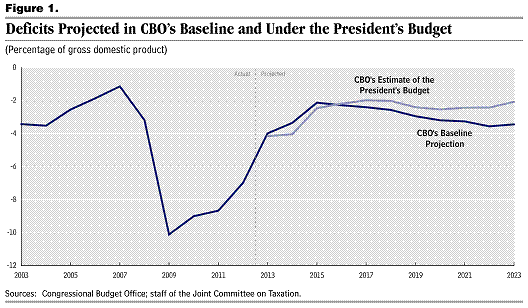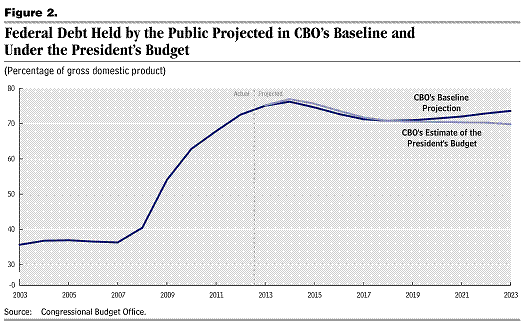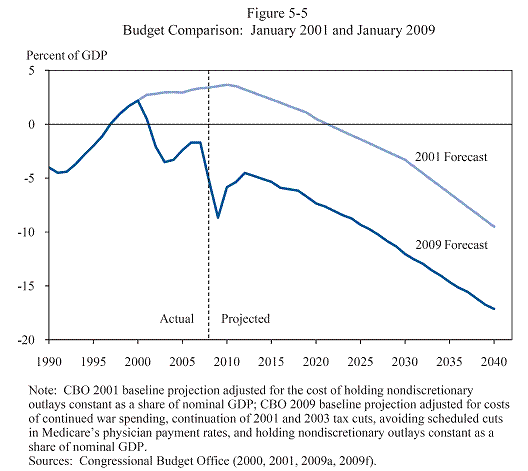According to the CBO, under the President’s budget, the deficit hovers around 2% of GDP, and debt-to-GDP stabilizes through 2023 at levels lower than today’s.
Hence, were the President’s budget to be implemented, the budget would be on a path to medium run stabilization. This point is illustrated in Figures 1 and 2 from the CBO report.

Source: An Analysis of the President’s 2014 Budget.

Source: An Analysis of the President’s 2014 Budget.
Now, it’s clear that with the Congress we have, it is highly unlikely that the President’s budget would be implemented. On the other hand, these scores (recalling that the Ryan House budget plans have never been “scored”, except by Heritage CDA) indicate that stabilization of debt-to-GDP ratios do not require draconian cuts to entitlements and discretionary spending.
Over the longer term, health care costs will push upward expenditures, and hence deficits (although by how much is now debatable [1] [2]) This is not a new concern; it was a concern back in 2001. But then, the outgoing (Clinton) Administration had hoped that a conservative fiscal policy could build up assets to support entitlement spending. Instead, the new administration in 2001 implemented tax cuts (and some discretionary spending in the form of Operation Iraqi Freedom), which resulted in a shifting forward the onset of the deficit. This is shown in Figure 5-5 from the 2010 Economic Report of the President:

Source: Economic Report of the President, 2010.
Whenever I look at this graph, I always wonder what the self-avowed fiscal conservatives of today were pushing in 2001; I’m guessing tax cuts. I also think about what we could have done in terms of stimulus in 2009-2011 had we not squandered trillions on tax cuts when close to full employment (as I observed on Econbrowser in 2006).
Update, 5/21, 11am Pacific: Reader William wonders about the use of the word “squandered”. Bruce Bartlett at Economix has a timely recounting of exactly how little benefit we as a country obtained from the tax cuts (surely some people benefitted a lot, but probably nobody I know personally). As Bartlett notes:
In 2011, the economist Alan Viard of the conservative American Enterprise Institute told Bloomberg News, “The effects of the Bush tax cuts on growth were ambiguous at best.” He added, “They were not much of a poster child for pro-growth tax policy.”
That should be the epitaph for the EGTRRA and JGTRRA.
Menzie,
If I understand your point you hold that if Obama’s budget was passed we would all be living in Nirvana? What have you been smoking? He can’t even get the votes of his own party.
In business if you showed a 10 year projection of just about anything you would be laughed out of the room – because they are meaningless. You can’t predict that far out.
The key variables in the budget deficit are:
1. GDP growth
2. Health Care spending growth
3. Whether we get into a war
None of these are close to predictable with any certainty.
Arguments about the deficit should start by admitting long range projection are nonsense.
One example – the current CBO projected deficit for 2015 is lower then if Simpson-Bowles 1 would have been enacted.
Until you post proof that you have a cleared check written to the U.S. Treasury for your share of the tax cuts, I think squandered is an inappropriate description of the tax cuts / fiscal stimulus.
I’m not sure everyone agrees that the government can or should be spending more rather than less of everyone’s discretionary income.
If government spending stimulates the economy, it needs to be reversed in normal times. Otherwise it is just growth for growth’s sake. I believe Milton referred to it as the balance wheel..
As far as regulations are concerned (referencing a previous post), why do you consistently fail to point out over-regulation such as the cost of milk based on its distance from Eau Claire? Or do you support price fixing too?
Not sure I understand the liberal agenda in economics, other than to transfer wealth from producers to non-producers. Perhaps this is a necessary evil to support social order, but when is enough enough.
Finally, history won’t really be able to judge Obama for decades, so I wouldn’t get too excited about all the great stuff he has “done for us”.
The issue in many ways revolves around the meaning of a phrase. Remember GWBush described tax cuts as returning money to the people. That’s also what Medicare, Medicaid, Social Security and a host of other programs do.
And behind this difference lies a host of other issues. To mention one main one, something you’ve talked about because it’s numbers, the idea behind “returning money” is that this money will then be used to generate more prosperity. I’m with the group that looks at the data and says that hasn’t happened so something is wrong with that idea.
William: I’ll turn over the microphone to Bruce Bartlett at Economix, formerly a DAS in G.H.W. Bush Treasury, and Heritage Foundation senior fellow
Menzie: Thanks for posting the link. I agree that we would be in a better position today without the Bush tax cuts and the Iraq wars, but I maintain my belief that less is more, especially when it comes to government.
My liberal economics professor probably didn’t enjoy teaching my MBA class about Ronald Reagan, but his regime (Volcker) made a lot of important changes. Deregulation can be just as powerful and important as new regulation. Or as McCain and co. puts it: old legislation should be sunset. A well run business does discards what doesn’t work. Government should too.
The following seems reasonable, up until the last point:
five-senators-who-know-how-to-control-federal-spending
Either way, MBAs are taught to game the system, so whatever G does, we’ll work around it. I suppose there’s a reason why Micro works and Macro doesn’t..
Menzie,
Bruce Bartlett has been supporting Progressive ideas for over a decade. He has not been an Heritage since 1987 and working for G.H.W. Bush is no libertarian credential. Please, don’t pretend that Bruce Bartlett has not gone over to the “dark side.”
William: I agree sometimes less is more. Please refer to Figure 1 in this post. Notice the decline in spending during the Clinton and Obama Administrations.
Ricardo: I didn’t say he was libertarian. Yes, he did work at that famously leftist organization National Center for POlicy Analysis until 2005 (I’m sure anything that’s to the left of Attila the Hun counts as “progressive” in your book).
Menzie wrote:
(I’m sure anything that’s to the left of Attila the Hun counts as “progressive” in your book).
Menzie,
You are absolutely correct. Anything to the left of Attila the Hun is Progressive because Attila was “Progressive.” He was the consumate central planner and held the state – his state – above all else. Attila was far from liberal, eschewing anything close to a free market. In other words,Attila was right on Progressive.
Aren’t the “Bush tax cuts” now just as much the “Obama tax cuts”? Obama basically signed off on making those same tax cuts permanent, in exchange for a rather small adjustment in rates for those at the very top.
Granted, when Obama signed them, the economy wasn’t close to full employment, but “permanent” cuts don’t seem to be intended as a temporary stimulus measure either. They will presumably be in place still once we are again near full employment.
acerimusdux: I agree that the remaining tax cuts are Obama’s now. And in that context, I would have preferred the tax reduction to disappear at a substantially lower income threshold than was actually implemented (although to kick in the future, when nearer to full employment).
But the main point is that over the years of the Bush tax cuts (EGTRRA, JGTRRA), a trillion or more of debt was accumulated in counterproductive procyclical fiscal policy.
William My liberal economics professor probably didn’t enjoy teaching my MBA class about Ronald Reagan, but his regime (Volcker) made a lot of important changes. Deregulation can be just as powerful and important as new regulation.
Did your conservative teachers enjoy telling you that Volcker was first appointed by Carter in 1979? Did they enjoy telling you that it was Carter who did most of the really big deregulation things. For example, Carter was responsible for most of the deregulation in the transportation sector. And did they tell you that it was under Carter that legislation was enacted to phase out the interest differential in Regulation Q?
Micro works and Macro doesn’t
Micro has its share of simplifying assumptions.
William wrote:
I don’t understand why you call this a “liberal agenda”. What does this have to do with “liberal”, in contrast to “non-liberal”? You simply describe how capitalism has worked as an economic system from the beginning. The wealth is produced by the producers, i.e., the workers, which is transferred to the non-producers, i.e., the capital owners, through the power of their ownership (directly or indirectly) of the means of production.
Good lord.
1. The CBO is NEVER accurate forecasting anything more than 24 months out.
2. THIS entire forecast assumes no recessions from now until 2023. LOL get real. One recession and this thing is toast. 2% is the best we can get to without any hiccups? So basically we’re done for.
“Did they enjoy telling you that it was Carter who did most of the really big deregulation things.”
Wait, do libs love or hate regulation?
Jan,
“The wealth is produced by the producers, i.e., the workers, which is transferred to the non-producers, i.e., the capital owners, through the power of their ownership (directly or indirectly) of the means of production.”
Where did the capital owners get their capital? Where did Buffett get his capital? Where did Gates get his? Where did Jobs get his?
Anonymous at May 23, 2013 09:52 AM asked:
Is your question about where the capital owners got their start capital with which they become capitalists?
The start capital can have various sources. It could be their own labour, it can be inherited, or just dumb luck, e.g., by winning the lottery. In the early stages of capitalism in Europe, it also was often acquired by pure force and violence, e.g., by forceful expropriation of the peasants who owned their means of production.
But it doesn’t matter. Whatever the source of the start capital was or is. Once they become capitalists, once they employ other people, the wealth, the additional capital the capital owners accumulate, is created by the human labour of the producers who work for them. This wealth is transferred from the producers to the capital owners solely through the power of the ownership.
The billions of dollars accumulated in the accounts of Buffet, Gates, or Jobs, is transferred wealth created by the people who work for the companies owned by them. This wealth has not been created by magic fairies. It has been created by human labour.
Yes, Jan, but you seem to imply that capital owners do not deserve the rewards of owning appropriately deployed capital.
Gates and Jobs accumulated capital because they created goods and services people REALLY REALLY enjoy. They also created tons of jobs, whose human labor added greatly to their wealth. So are you unhappy they created jobs? Or are you arguing they didn’t share enough of the rewards from their wise business decisions. You seem like an insufferable whiny lib.
Anonymous at May 23, 2013 01:45 PM wrote:
Now, you are making a moral argument. What I wrote was not a moral argument, it was an analytical-descriptive argument about wealth redistribution in capitalism, which doesn’t imply any moral conclusion. I just said what is. Any moral conclusion you draw from this is all your own. And you can’t logically refute the analytical-descriptive argument with moral arguments.
There is no objective criterion how much wealth a person “deserves”. Moral judgements about this, like any moral judgement about anything is totally subjective. But since you bring this argument how the billionaires are billionaires because they “deserve” it. Does this mean you also think that the have-nots in this world are poor because they “deserve” to be poor, accordingly? That everyone has what he/she has, because it’s what he/she “deserves”?
You must believe these two were superhuman, if you think this was all done by them personally. In reality, though, most of this was done by the people who have been employed by the companies owned by them, scientists, engineers, programmers, workers.
The causal relationship is between ownership of capital and wealth accumulation in capitalism, not between what great things Gates and Jobs had done and wealth accumulation.
This, again, presumes that I judge them with respect to their ethics. I don’t. However, I do think more secondary wealth redistribution should happen from the owning and investing class to other parts of society. Not on moral grounds, but on practical grounds. Because it’s useful for society.
I do not know what I said to have deserved your insulting tone, and you seem to be projecting your own whiny attitude on me, since I am not the one who feels morally offended, when the reality of the workings of the capitalist economy is being stated.
Gotcha, you’re not making any points or taking a side on anything.
“You must believe these two were superhuman, if you think this was all done by them personally. ”
Nobody thinks this. You’re making Obama’s “you didn’t build that” argument. Of course the majority of what their firms accomplished came via other people’s labor. So what?
“However, I do think more secondary wealth redistribution should happen from the owning and investing class to other parts of society. Not on moral grounds, but on practical grounds. Because it’s useful for society.”
What defines the investing class? How about anyone living above 50K income? I mean that really is all you need to live a reasonable life. Anything above that should be confiscated and redistributed to Sub sahara africa or north korea where people are hurting.
I’m just baffled at the nature of argumentation that shows up in response to posts like this. I understand Ricardo going with snide instead of substance. Willfully misunderstanding Menzie when Menzie marshals a set of facts is what Ricardo does. I’m less familiar with William, but this “write a check for your share of tax cuts” just runs away from Menzie’s argument. It sets a moral test – a purely made-up, silly moral test – as a distraction from Menzie’s argument. If Menzie were a really terrible person, an inveterate liar – let’s say Menzie is Dick Cheney – the points he makes would still be right or wrong based on their own merit. Menzie doesn’t need to fit himself into tax-haters’ fantasies in order for his argument to hold water. His argument holds water or springs leaks on its own. Same with “the liberal agenda”. Same with the whole “capitalists deserve” this or that stuff. They are just right-wing bait to distract the weaker-minded among us from considering arguments like Menzie’s on their merit. Try addressing his points without dressing them in nonsense.
Two comments have to do with relying on budget forecasts in future years. That is a problem, but as long as Congress is debating budget changes meant to deal with anticipated long-term problems, we need a baseline to assess whether anticipated problems are likely to become manifest, how large they will be in budget terms and how various proposed solutions will work. Krugman (among others) has pointed out that the “solution” that Ryan and others have proposed to the “problem” with Social Security is to reduce payments in the medium term so that we don’t have to reduce payments in the longer term. That rhetorical sleight of hand on Ryan’s part masks the fact that medium term cuts last into the long term. The reality of Ryan’s proposal – that it is simply a cut to promised payments over an unnecessarily long period starting in the medium term, in order to avoid cuts in the long term that may not actually be necessary – is hard to see if you don’t bother doing long-term analysis.
So sure, don’t allow long-term forecasts into the discussion, but then don’t allow claims about long-term budget deficits or debt in the discussion, either. Bring the business-cycle adjusted budget close to balance and adjust as necessary, ignoring the long-run. We’ll all just be grasshoppers and tell the ants to shove it.
Holy cow the CBO has jumped the shark. On table 1-1 they list their GDP predictions.
2013-2022 growth rates are as follows:
2.0% 3.3% 6.4% 6.5% 6.1% 5.3% 4.9%4.5% 4.3% 4.3%
and then projecting 4.3% economic growth for infinity. I guess we can stop discussing their reports as they are total malarkey.
Anonymous: I think you are reading the *nominal* growth rate row, not the real (if you are referring to the February 2013 Budget and Economic Outlook.
I am sir, I find it specious. Growth like that is going to require growing serious bubbles. We haven’t seen 3 years growth like that since the housing bubble, and before that Reagan was President. When Ronnie was president, we had better demographics and we basically doubled debt to GDP in 8 years.
So unless we’re going to blow up a crazy bubble, I don’t see it happening. But then, I evaluate risk for a living, and the CBO tells fairy tales for a living, so maybe they are right.